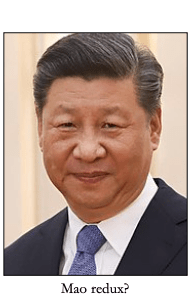
Xi Jinping has it all: general secretary of the Chinese Communist Party, chairman of the Central Military Commission, commander-in-chief of the People’s Liberation Army, and the Politburo Standing Committee filled with his own hand-picked loyalists. He is, in all but title, the emperor of China.
For a dictator, this is the dream. It doesn’t get any better. Not only the absolute master of the world’s most populous nation—1.4-billion people at your feet—but a nation of rapidly growing power and wealth.
China has been a phenomenon in this century. Spectacular economic growth turning the nation into an industrial powerhouse, creating multitudes of millionaires and billionaires, and pulling tens of millions out of poverty.
But as Xi assumes totalitarian control, clouds appear on the horizon, some of his own making.
His total lockdowns to achieve “zero-Covid” have paralyzed businesses, disrupted global supply chains and suppressed consumer spending. His efforts to curb property speculation have caused dozens of real estate developers to default on their debts and contributed to a slump in the housing market. His commitment to “common prosperity” has caused entrepreneurs to flee the country.
Worth noting was that the party delayed releasing GDP data until the second day of the recent party congress. It had risen 3.9 percent in the third quarter, below Beijing’s 5.5 percent target. In the second quarter, China’s economic growth was actually slower than that of the U.S.
American sanctions haven’t helped and President Biden has upped the ante with regulations designed to curtail China’s effort to build an independent semiconductor chip industry. Analysts say the rules could set the country’s chip industry back decades, impeding large segments of Chinese technology.
Xi has recently been showing signs of becoming more interested in Marxism than markets. After all, as powerful as he is, he is still to some degree captive to the communist party, and perhaps freewheeling capitalism is losing its lustre in the eyes of the comrades.
In any case, surrounding himself with toadies is unwise, as Vladimir Putin is discovering. His lackeys will compete not to present the best ideas but to present the best loyalty. Stacking the politburo with his yes-men (he appointed no yes-women) sends a clear message that conformity is the road to success.
And for Xi could be the road to failure. He is now the the maximum leader, he is where all the bucks stop. The nation’s achievements will be his, but so will its mistakes. He is the new Mao and we all know where that led.